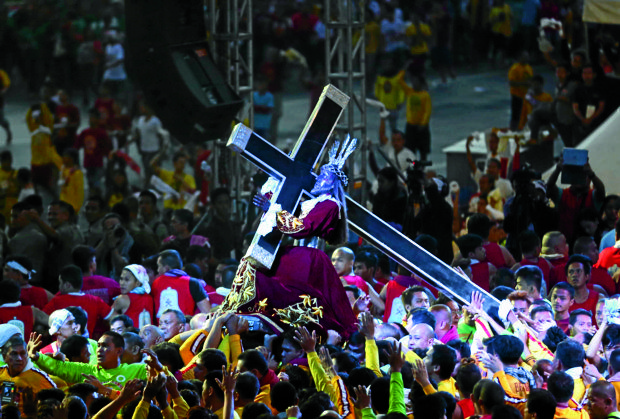
BIGGEST RELIGIOUS EVENT Millions of devotees and tourists are expected to join the country’s biggest religious
event. INQUIRER FILE PHOTO / NINO JESUS ORBETA
To ensure security, drone flights over the route of the Black Nazarene procession in Manila on Jan. 9 will not be allowed, the military said on Wednesday.
As in previous years, cell phone signals will be jammed throughout a swath of the city expected to be packed with millions of devotees and tourists during the Philippines’ biggest religious event, Lt. Col. Llewellyn Binasoy of the Armed Forces of the Philippines told reporters at Quiapo Church, the shrine of the Black Nazarene.
The AFP is helping the Philippine National Police in securing the Feast of the Black Nazarene, highlighted by the traslacion, or the procession that carries the black wooden statue of Jesus Christ carrying a cross from Luneta Park to Quiapo Church.
“We support the PNP to ensure that this will be a meaningful, solemn and significant occasion for our people, especially the devotees,” said Col. Edgard Arevalo, chief of the AFP public affairs office.
Millions of barefoot devotees take part in the painfully slow procession from the park to the church, which takes at least an entire day.
The procession set a record in 2012, taking 22 hours. Last year, it took 20 hours.
The National Capital Region Police Office said there were no threats to the procession, but security would be tight.
“We would like to give this fair warning to everyone that part of the security measures is the no-fly zone during the procession,” Binasoy said.
“We also ask the media and the public not to have their drones in the air,” he added.
News organizations usually use drones to take aerial pictures of crowds.
Binasoy appealed for public understanding of the need to jam cell phone signals. “That is part of the security preparations,” he said.
Cell phones can be used to detonate bombs, as shown by last week’s attack during a town fiesta in Hilongos, Leyte province.
“Last year, it was implemented. That’s why the same thing and dissemination are being undertaken [this year],” Binasoy said.
Manila’s Department of Public Services Director Lilybelle Borromeo called on devotees not to throw their trash on the streets.
No trash bins will be placed in the vicinity of Quirino Grandstand, where the procession will start, to prevent bomb scares, according to Dr. Virgilio Martin of the Manila Health Office.
No jumping into the river
Procession organizers called on devotees not to jump into the Pasig River when the carriage of the Black Nazarene passes over Jones Bridge.
Manila health coordinator Malou Geralde warned devotees that jumping into the murky waters of the river may be dangerous to their health.
“The water is toxic, it’s not healthy,” Geralde said.
The Philippine Coast Guard said motorboats would be stationed near the bridge to watch for jumpers.
Jumpers will be investigated, the Coast Guard said.
The Bureau of Fire Protection will deploy fire trucks, ambulances, rescue trucks and personnel for the procession.
K-9 units will also be deployed by the military.
The Manila health office will also deploy medical teams at Quirino Grandstand on a 12-hour shift starting Jan. 8.
The Metro Manila Development Authority (MMDA) will extend the operating hours of the Pasig Ferry to give devotees an alternative mode of transportation during the feast.
The first trip, from Guadalupe to Escolta, will leave at 5:30 a.m. and the last trip, from Escolta to Guadalupe, will depart at 7 p.m.
For devotees from the provinces, the MMDA will offer a 20-percent discount on accommodations at its Gwapotel inn on Bonifacio Drive in Port Area. —WITH REPORTS FROM CYNTHIA D. BALANA AND ERIKA SAULER